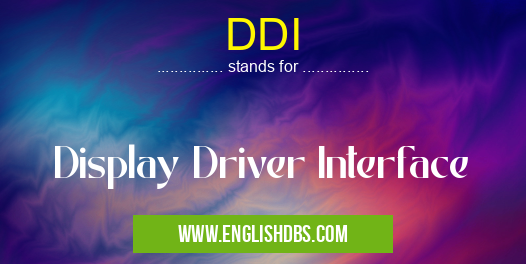What does DDI mean in SOFTWARE
DDI stands for Display Driver Interface, a software library developed by Microsoft which allows user to develop their own display drivers in order to extend the functionality of Windows. DDI provides an interface between the operating system and graphics hardware which enables users to customize their experience as it pertains to video display and performance.

DDI meaning in Software in Computing
DDI mostly used in an acronym Software in Category Computing that means Display Driver Interface
Shorthand: DDI,
Full Form: Display Driver Interface
For more information of "Display Driver Interface", see the section below.
Essential Questions and Answers on Display Driver Interface in "COMPUTING»SOFTWARE"
What is a Display Driver Interface (DDI)?
A Display Driver Interface (DDI) is a set of standards for the interface between an operating system and a graphics display device or devices. It defines how graphics software interacts with the hardware and how applications running on the operating system are displayed on the screen.
How does Display Driver Interface (DDI) work?
The Display Driver Interface (DDI) acts as an intermediary between an application program and the graphics hardware, allowing them to communicate with each other. The DDI allows the operating system to access different types of display hardware, such as video cards, and access their functions in order to implement various features, such as drawing objects on the screen or displaying multiple windows at once.
What are some of the benefits of using Display Driver Interface (DDI)?
The main benefit of using a Display Driver Interface (DDI) is that it simplifies and standardizes communication between an application program and the hardware. This allows for easier interoperability between programs running on different platforms and provides better performance due to optimized access to resources such as memory and registers which can be shared among all programs running in an environment.
How does DDI make driver developers' lives easier?
By providing a standardized interface, DDI makes driver development much easier as developers do not have to write new code for each type of display device they wish to support. Additionally, it ensures compatibility across different platforms so drivers written for one type of system will work on another without having to be rewritten from scratch.
What types of operations does DDI support?
The Display Driver Interface supports a wide range of operations related to graphics including setting up images, drawing shapes, applying special effects like anti-aliasing or gamma correction, creating power states that save energy while maintaining image quality, managing surfaces used by applications and managing multiple outputs simultaneously like dual monitors or 3D displays.
Is DDI compatible with Windows OS?
Yes, DDI is compatible with Windows Operating System including Windows 7, 8.1 and 10. In addition it is also compatible with other operating systems such as Mac OS X and Linux.
Final Words:
In summary, DDI is an invaluable tool for developers who want to customize their experience with Windows devices related to video display and performance optimization. By introducing a unified set of interfaces accessible via external libraries provided by Microsoft, DDI simplifies graphics programming significantly while also eliminating compatibility issues associated with using multiple vendors' drivers.
DDI also stands for: |
|
| All stands for DDI |
